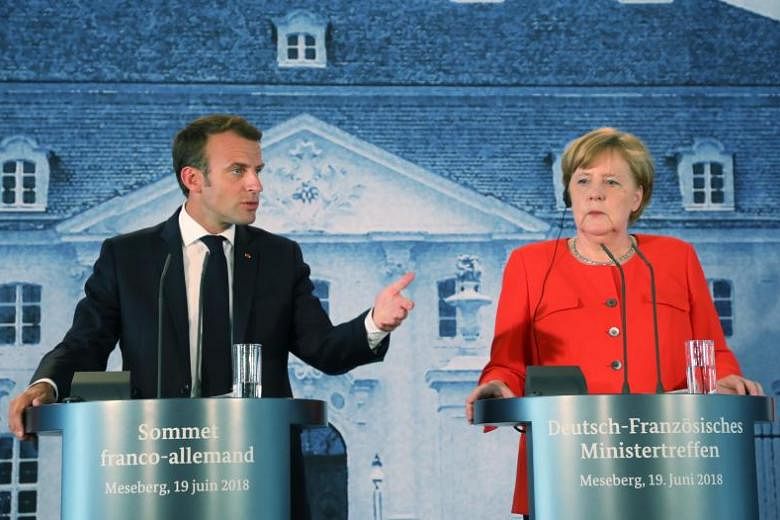BERLIN (REUTERS, AFP) - German Chancellor Angela Merkel and French President Emmanuel Macron agreed on Tuesday (June 19) to create a euro zone budget charged with boosting investment in the bloc and promoting economic convergence between its 19 states.
The leaders met to prepare for a summit of European Union leaders on June 28-29, with Mr Macron keen to push through wide-ranging reforms to strengthen the euro zone and insulate the single currency union from future crises, while Dr Merkel has been more cautious.
Dr Merkel said euro zone reform was the toughest issue in their talks at her Meseberg retreat outside Berlin, where they also touched on European foreign and defence policy and immigration.
"We are opening a new chapter," Dr Merkel said after the talks.
"We are working to make sure that the euro zone budget will be used to strengthen investment, also with the aim of strengthening convergence within the euro zone," she added.
"Because we know that a economic and monetary union can only remain intact if economic policies converge."
While Europe's economy has picked up and there is no immediate sign of financial stress, many analysts maintain that reforms are needed to protect the single currency.
Dr Merkel, under pressure at home where her conservatives are divided on how to curb migrant arrivals, said she was optimistic her government and Parliament would back the euro zone reforms.
"We have an draft for a new euro zone and that is a really good thing, I would say," she said.
Mr Macron said the new joint euro zone budget agreed would be operational by 2021. Details of the budget, including its amount and whether it would be financed by national sources or a bloc-wide tax, would be hammered out by ministers before the end of the year, he said.
Mr Macron and Dr Merkel called on Tuesday for a joint European response to the EU's flashpoint challenge of immigration amid deep divisions in the bloc.
Mr Macron said the EU needs "a European response to the migration challenge", with more capacity for border agency Frontex to monitor its outside borders.
He also said Paris and Berlin are in favour of deals that would allow EU member states to reject at their borders asylum-seekers already registered elsewhere in the bloc, usually their first port of call.
"France and Germany will ensure that those who are registered in a Schengen zone country can be taken back as quickly as possible to the country where they were registered," he said, vowing to achieve this through bilateral and multi-national agreements.
This would meet a demand Germany's hardline Interior Minister Horst Seehofer made forcefully last week, spelling a political crisis for Dr Merkel.
Dr Merkel, who must now seek agreements with other member states to appease Mr Seehofer, said that "we are in favour of supporting affected states, and of course for solidarity between member states".
She added that "Italy is especially hard hit because of Libya", now the main gateway for African migrants.
Mr Macron also called for a "more efficient system of solidarity and responsibility" on registering and distributing asylum-seekers.
He also said the EU should step up dialogue with migrants' countries of origin and of transit, and especially with conflict-torn Libya, to stop illegal traffickers.
More broadly, the French President said Europe, with a rise in populist right-wing forces, faces "a moment of truth" and must seek common ground on migration as well as economic, political, financial, environmental and defence issues.
He said the EU now faced a "civilisational choice" between those who would allow Europe to "unravel" and "those who believe, as we do, that we can move Europe forward by making it both more sovereign and united".

